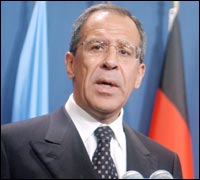Russia, citing Iraq, declares more diplomacy is needed to solve Iranian nuclear dispute
Russia's foreign minister, critical of moves to have Iran brought before the U.N. Security Council, said that Iraq is a timely reminder of what can happen when the world turns its back on diplomacy.

"We don't want to be the ones to remind (everyone) who was right and who was not in Iraq , although the answer is obvious," Sergey Lavrov said Thursday in an interview on Russian state television. He added that the International Atomic Energy Agency the U.N.'s atomic watchdog should have been given more time to deal with Tehran .
Meanwhile, the Foreign Ministry urged Iran to "look most seriously" at the results of this week's IAEA board meeting and "fully cooperate" with the nuclear watchdog. In a statement, the ministry added that if Iran meets all IAEA requirements, it will be possible "to find a solution that would guarantee the implementation of Tehran 's legitimate right to the peaceful use of nuclear energy."
A report by IAEA chief Mohammed ElBaradei on Iran 's nuclear program is being submitted to the Security Council, which must decide what steps to take. Measures could range from a mild statement urging compliance to sanctions or even military measures.
Russia has been highly critical of what it sees as a rush by Washington to get Iran's nuclear file under discussion in the Security Council, and Moscow has been at pains to broker a deal to slow the process.
Moscow has proposed to host Iran 's uranium enrichment program, but only on condition that Iran resume a moratorium on enrichment at home.
Lavrov suggested Thursday that Washington wanted to portray the IAEA as unable to influence Tehran . "This move is detrimental, and not one real problem can be decided with such a move," he said.
He insisted that the IAEA should continue to play a pivotal role.
The Council "under no circumstances should undertake the main role in determining existence or absence of nuclear weapons proliferation risks," Lavrov said, according to the ITAR-Tass news agency. The interview was to be broadcast in full later Thursday.
On Wednesday, Lavrov questioned the use of sanctions, saying they rarely achieve their goals.
In addition to its diplomatic prestige, Russia 's heavy commercial involvement with Iran , a Caspian Sea neighbor, is on the line.
Russia is completing construction of a US$800 million nuclear reactor in the port of Bushehr in southern Iran , set to go on line later this year. Tehran said it would welcome Moscow 's bid to build more reactors in the future lucrative cooperation that would be shattered by U.N. sanctions.
Some Russian experts fear the dispute is in danger of escalating, pointing to Wednesday's threat by Tehran that the United States will feel "harm and pain" if the Security Council takes action.
"The situation is being exacerbated and heading toward the beginning of military action," said Yevgeny Satanovsky, a Moscow-based expert in Mideast affairs.
Iran claims its nuclear program is peaceful and only aimed at generating electricity, but an increasing number of countries share the U.S. view that Tehran is seeking to develop atomic weapons.
Russia believes Iran is not pursuing nuclear weapons in a vacuum, but in response to what it sees as a U.S. threat, said Celeste Wallander, with the Washington-based Center for Strategic and International Studies.
The alleged arms development is "politically contingent on feeling threatened and a desire to be able to deter the United States either by actually having the weapons or by being able to say that it could have the weapons," she said, reports the AP.
D.M.
Subscribe to Pravda.Ru Telegram channel, Facebook, RSS!


